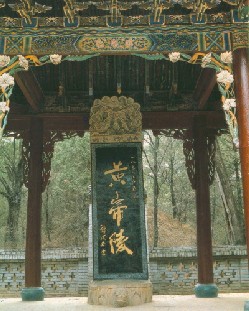|
Traditional / Mythic History
of China
THE THREE SOVEREIGNS (San huang)
 |
|
"Tomb"
of Huangdi
|
- Fuxi ("Subduer of Animals"): 29th c. BCE
- hunting and fishing implements
- animal sacrifice
- hexagram divination
- Shennong ("Divine Farmer"): 28th c. BCE
- Huangdi ("Yellow Emperor"): 27th c. BCE
- writing, silk, boats, carts, bow/arrow
invented under his rule
THE THREE SAGES (San sheng)
- Yao: 24th c. BCE
- central government, calendar, rites and music
- passed over his own son, selected Shun as successor based on
merit
- Shun: 23rd c. BCE
- filial son of cruel parents
- selected Yu as successor on basis of merit
- Yu: 22nd c. BCE
- controlled the flooding of the Yellow River
- selected his son Qi as successor because people were attracted
to him, thus founding the first dynasty (Xia)
THE THREE DYNASTIES (San dai)
- Hsia: 22nd - 18th c. BCE
- virtuous founder: Yu
- evil last king: Jie
- - - - - - - - - - - -
DOCUMENTATION BEGINS - - - - - - - - - - - -
- Shang (Yin) : 18th - 12th c. BCE (traditional)
16th - 11th c. BCE (modern estimate)
- last capital at Yin (Anyang), hence alternative name
- oracle bones: 12th - 11th c.
- virtuous founder: Tang
- evil last king: Zhou (different from name of next dynasty)
- Zhou: 1122 (or 1050) - 221 BCE
- Western Zhou: capital at Chang'an (modern Xian)
- King Wen: imprisoned under King Zhou
of Shang;
wrote hexagram texts of Yijing
- King Wu: son of King Wen; overthrew Shang
- Duke of Zhou: King Wu's brother; regent
for King Wu's son, King Cheng
- Eastern Chou: capital at Luoyang
- 722-481: "Spring and Autumn" period (Confucius
551-479)
- 481-222: "Warring States" period (Mencius,
Xunzi, Zhuangzi, etc.)
|